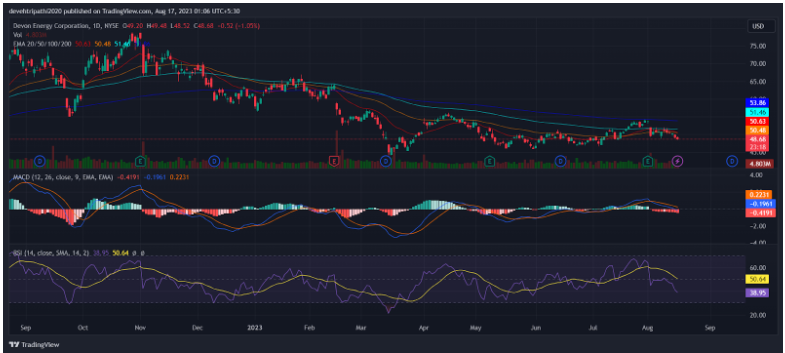Devon Energy Corporation is a hydrocarbon exploration business based in the United States. It is incorporated in Delaware, and its operational offices are located at the 50-story Devon Energy Center in Oklahoma City, Oklahoma. Its main activities are in the Oklahoma Barnett Shale STACK formation, the Delaware Basin, the Eagle Ford Group, and the Rocky Mountains.
The firm was placed 216th on the Fortune 500 and 445th on the Forbes Global 2000 in 2023.
The business has proven reserves of 1,625 million barrels of oil equivalent (9.94109 GJ) as of December 31, 2021, of which 44% were petroleum, 27%weres natural gas liquids, and 29% were natural gas.
John Nichols and his son, J. Larry Nichols, launched Devon in 1971. The firm went public in 1988 through an initial public offering. The firm was included in the S&P 500 in August 2000. Devon was one of many petroleum firms targeted by shareholder resolutions in 2004 that would have obliged the businesses to evaluate their impact on climate change. John Nichols, a co-founder, died in August 2008.
Prices:
Devon Energy Corp.’s stock price is now 48.59, with a total market value of 31.18 billion (44 million shares outstanding). Devon Energy Corp. trades under the symbol DVN on the New York Stock Exchange. Devon Energy Corp.’s stock price has risen by -1.23% in the last 24 hours. The stock price prognosis for Devon Energy Corp. is now positive. Devon Energy Corp.’s trailing twelve-month dividend rate is $2.56 per share, yielding 0.05%.
Devon Energy’s market capitalization, or net value, is $31.18 billion. The company is worth $37.75 billion. The most recent short interest is 14.44 million, representing 2.25% of the outstanding shares. Devon Energy has 641.70 million outstanding shares. In one year, the number of shares has declined by -2.77%. Devon Energy had $17.01 billion in revenue and $4.78 billion in earnings in the previous year. The earnings per share were $7.32. The firm now has $488.00 million in cash and $6.71 billion in debt, for a net cash position of -$6.22 billion or -$9.70 per share. Operating cash flow was $7.10 billion in the previous year, while capital expenditures were -$6.01 billion, for a free cash flow of $1.09 billion.
The gross margin is 54.29%, while the operating and profit margins are 37.63% and 28.10%, respectively. Operating cash flow was $7.10 billion in the previous year, while capital expenditures were -$6.01 billion, for a free cash flow of $1.09 billion.
Analysis:
Devon Energy Corporation (DVN) stock has dropped by 2.96% in the last month and is down by 13.72% over the previous six months. Devon Energy Corporation stock is down 19.00% year to date and down 21.91% year to date.
The average volume is 8.472 million, whereas the current volume is 7.084 million, indicating that the current selling volume is lower than the average volume.
Devon Energy Corporation’s stock price took support around $45.94 and has been on an upward trend for the previous three months, gaining by 5.58% while hitting higher highs and lower lows. The DVN stock is currently trading at approximately $49.19, with resistance at around $51.29, and is decreasing by making lower lows and highs.
As a result, if the DVN price fails to maintain its present level and falls, it may reach the nearest support levels of $48.31 and $45.94.
On the Daily Chart:
- Devon Energy’s (DVN) Moving Averages Convergence Divergence (MACD) indicator is more than -0.01, indicating a Buy.
- Devon Energy’s (DVN) 20-Day exponential moving average is 50.82, and the stock price is $48.56, indicating a Sell.
- Devon Energy’s (DVN) 50-Day exponential moving average is 50.40, and the stock price is $48.56, indicating a Sell.
On the Weekly chart:
- The Moving Averages Convergence Divergence (MACD) indicator for Devon Energy (DVN) is -1.30, indicating that Devon Energy is a Sell.
- Devon Energy’s (DVN) 20-Day exponential moving average is 50.78, and the stock price is $48.56, indicating a Sell.
- Devon Energy’s (DVN) 50-Day exponential moving average is 52.45, while the stock price is $48.56, indicating a Sell.
Indicators:
- The Relative Strength Index (RSI) for Devon Energy (DVN) is 45.41, indicating a Neutral signal.
- The Trend Strength Indicator (ADX) for Devon Energy (DVN) is 21.43, indicating a Neutral signal.
- The Commodity Channel Index (CCI) for Devon Energy (DVN) is -9.47, indicating a Neutral signal.
- The Price Rate of Change (ROC) for Devon Energy (DVN) is -0.91, indicating a Sell signal.
Devon Energy Corporation is trading below the 20, 50, 100, and 200-day exponential moving averages, indicating that the DVN price trend has been rejected. As a result, the DVN price is likely to fall, indicating a negative outlook on the daily time frame chart.
Prediction:
Devon Energy shares’ value will fall by -7.33% to $45.31 per share by August 21, 2023, according to our current DVN stock projection. Our technical indicators indicate that the present attitude is Bearish, with the Fear and Greed Index reading 39 (Fear). Over the previous 30 days, DVN stock had 17/30 (57%) green days and 3.10% price volatility. According to our Devon Energy stock forecast, now is a terrible time to purchase DVN stock because it’s trading 7.37% higher than we predicted.
Devon Energy Stock Forecast 2025
Devon Energy’s stock forecast for 2025 is now 61.34, assuming Devon Energy shares continue to increase at the same average annual rate as in the previous ten years. The DVN stock price would rise by 26.09% as a result.
Devon Energy Stock Forecast for 2030
If Devon Energy maintains its current 10-year average growth rate, the stock will be worth $109.52 in 2030. If our Devon Energy stock forecast for 2030 comes true, the DVN stock will increase by 125.12% from its present price.




Leave a Reply